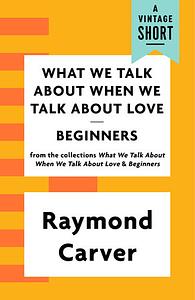Take a photo of a barcode or cover
1.94k reviews for:
What We Talk about When We Talk about Love / Beginners (A Vintage Short)
Raymond Carver
1.94k reviews for:
What We Talk about When We Talk about Love / Beginners (A Vintage Short)
Raymond Carver
Jesus, if I could write like this I’d never leave the house. He makes you realize things you already knew but you never thought of before. Then he hits you over the head with a liquor bottle while you’re staring at the wall, lost in thought.
having an "i can only finish books that are 150 pages long and it STILL takes me an excessive amount of time" kind of week.
or month.
or year.
or lifetime.
WHAT HAVE I BECOME.
or month.
or year.
or lifetime.
emotional
reflective
tense
fast-paced
this is my second read of the book. the first read didn't give me much impression, but i started to get it on my second.
the book's talking about love in the nuance of everyday occurrences. that's why the stories & conversations feel so real, frank, and grounded, it could be happen to anyone in anytime or anywhere. reality of love that come in different shapes, terms, perceptions that might not meet the idea of love at all.
raymond carver left love as a concept and chose to walk through it at first hand. love that looks so ugly, drunk, careless, and unfaithful. love that's angry, nostalgic, passionate, and desperate. love as the experience of human beings.
the book's talking about love in the nuance of everyday occurrences. that's why the stories & conversations feel so real, frank, and grounded, it could be happen to anyone in anytime or anywhere. reality of love that come in different shapes, terms, perceptions that might not meet the idea of love at all.
raymond carver left love as a concept and chose to walk through it at first hand. love that looks so ugly, drunk, careless, and unfaithful. love that's angry, nostalgic, passionate, and desperate. love as the experience of human beings.
It took a little time for me to get into the short, direct style of these stories. But once I did, I really enjoyed them. And the stories leave an surprisingly large impact once you read them, considering their sparseness.
I just want to express how fucking inspirational and magnetic Raymond Carver's prose is. This compilation specifically got me through high school in a way that I've been impressed with how stoic, yet powerful this guy manages to make from certain mundane situations. Tonally concise, heavily suburban, it's so difficult to replicate his writing style without coming off as a knock-off or a discount. Just simply gorgeous to read and imagine.
I expected, like, love stories that give the fuzzies, that heady high you get from being drunk on love. Yknow, like what this particular cover onspires. As I went through the book, I got those sure, but I also got pain, melancholia, confusion, and some more. This collection certainly reminded me that love is capable of inciting the widest and wildest range of emotion in a person. Definitely brought my feet back to the ground with this.
I first dove into the world of Raymond Carver ten years ago after picking up the "Short Cuts" collection on a whim. I don't recall exactly what made me pick it up; I hadn't, and wouldn't for some time, seen the film - even though, I can't imagine Robert Altman's endorsement hurt. Rereading him now, I find the stories still penetrate to that tender spot where people desire and fear connection. Some of the stories, "Why Don't You Dance?" for instance, seemed instantly familiar and others, particularly, "So Much Water So Close To Home", remain as devastating as they did upon those initial reads. I remain in awe.
dark
emotional
hopeful
inspiring
reflective
medium-paced
Great stories about love in America. Heard about it from Birdman and loved that movie so much I figured id give the book a try. My favorite quote was "there was this funny thing of anything could happen now that we realized everything had." Favorite stories were THE THIRD THING THAT KILLED MY FATHER OFF and the eponymous WHAT WE TALK ABOUT WHEN WE TALK ABOUT LOVE.
I picked this book up in New York. I wanted to buy something very American in the shop at the New York Public Library. This book in particular jumped out at me because I had recently been enthralled by Birdman in which Michael Keaton attempts to dramatise the story that lends the book its title. While this meant that I read said story almost exclusively in Ed Norton's voice the rest of the stories were a mystery to me, a sorrowful mystery perhaps given their tone. The stories start well with Why Don't You Dance? the kind of story that shows that a big impact Carver had on Haruki Murakami wherein a despondent middle-aged man puts all his possessions out on the front lawn (rearranged and presented as they were inside in the house itself, plugged in and all should somebody wish to watch his tv outside) and is visited by two somewhat cynical twenty-somethings who take it to be a garage sale. This is followed up by the even more Murakami-ish Viewfinder starring a wandering salesman with two hooks for hands.
Thankfully, Carver shows a different side of his writing with each passing story and so the kind of stories that Murakami seemed to have mimicked were left behind quite quickly bringing such favourites of mine as I Could See the Smallest Things, about a pair of disgruntled friends; The Bath, about a parent's worst nightmare; and Tell the Women We're Going, a particularly dark number that I did not expect to find having previously felt that I had sussed what the stories in this collection were "going to be about".
Throughout the text Carver develops character and interest quickly, snaring the reader, and communicates a lot of detail about his characters without writing as much as you'd think he'd need to. Details are sparse; dialogue is realistic and often contains characters repeating themselves as if nervous or distracted (which they often are) but each line or prosaic detail is important and well-placed. All in all this is a very well-crafted, varied set of short stories put together with real care and skill.
Thankfully, Carver shows a different side of his writing with each passing story and so the kind of stories that Murakami seemed to have mimicked were left behind quite quickly bringing such favourites of mine as I Could See the Smallest Things, about a pair of disgruntled friends; The Bath, about a parent's worst nightmare; and Tell the Women We're Going, a particularly dark number that I did not expect to find having previously felt that I had sussed what the stories in this collection were "going to be about".
Throughout the text Carver develops character and interest quickly, snaring the reader, and communicates a lot of detail about his characters without writing as much as you'd think he'd need to. Details are sparse; dialogue is realistic and often contains characters repeating themselves as if nervous or distracted (which they often are) but each line or prosaic detail is important and well-placed. All in all this is a very well-crafted, varied set of short stories put together with real care and skill.





